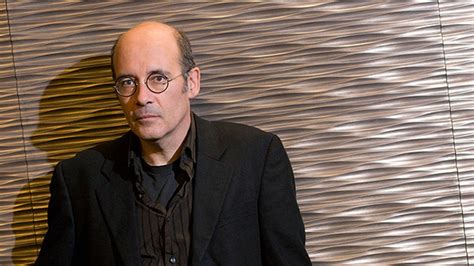A Quote by Jason Silva
Not too many people in cocktail parties are aware of Bioprinting and growing organs, or the coming technological singularity; I've seen very little philosophical speculation about how far we can go, how much we could achieve.
Related Quotes
It seems that the more places I see and experience, the bigger I realize the world to be. The more I become aware of, the more I realize how relatively little I know of it, how many places I have still to go, how much more there is to learn. Maybe that's enlightenment enough - to know that there is no final resting place of the mind, no moment of smug clarity. Perhaps wisdom, at least for me, means realizing how small I am, and unwise, and how far I have yet to go.
The frustration of our [The Daily] show is- very much outside any parameters of the media or the government. We don't have access to these people, we don't have access. We don't go to dinners we don't have cocktail parties. We don't you know, you've seen what happens when one of us ends up at the White House Correspondents' Dinner, it doesn't end well.
Be undeniably good. When people ask me how do you make it in show business or whatever, what I always tell them & nobody ever takes note of it 'cause it's not the answer they wanted to hear-what they want to hear is here's how you get an agent, here's how you write a script, here's how you do this-but I always say, “Be so good they can't ignore you.” If somebody's thinking, “How can I be really good?” people are going to come to you. It's much easier doing it that way than going to cocktail parties.
Just coming to terms with the fact that I got to play April Wheeler [Revolutionary Road] and Hanna Schmitz [The Reader] in one year, let alone in my lifetime. I'm very, very aware of how rare that is as an opportunity for any one person. I can't tell you how much I've been able to take away from these experiences creatively. I really, really learned so much about acting, about myself... all of those things. It's difficult to talk about the actor's process without sounding like an arrogant asshole but they really were very challenging.
I think making movie is kind of like getting fat people to walk 20 miles. If you just do it 100 yards at a time, and nobody knows how far they are going, they can do it!I would include myself in those fat people! You do this little by little and you don't realize your potential, or you don't realize how really rich, and how far you can go.
How far we all come. How far we all come away from ourselves. So far, so much between, you can never go home again. You can go home, it's good to go home, but you never really get all the way home again in your life.
...
whatever it was and however good it was, it wasn't what you once had been, and had lost, and could never have again, and once in a while, once in a long time, you remembered, and knew how far you were away, and it hit you hard enough, that little while it lasted, to break your heart.
All I know about 1970s New York City is that it's where I grew up, and you always have an umbilical connection to the time and place of your growing up. It was cheap, didn't have too many people in it, you could go to the movies or whatever on the spur of the moment, you could get by without working too much and especially without involving yourself in the corporate world.
How many of us have conflicts with someone else- and how many of us pray for that person? We have individuals with whom we are competitive, or whom we dislike or have a quarrel with; but very few of us have true enemies in the martial sense. And yet if Lincoln could pray fervently- and contemporary reports indicate he did- for the people who were opposing him, how much more can we do for someone we just find a little irritating?
I think moral philosophy is speculation on how we ought to live together done by people who have very little clue how people work. So I think most moral philosophy is disconnected from the species that we happen to be. In fact, they like it that way. Many moral philosophers insist that morality grows out of our rationality, that it applies to any rational being anywhere in the universe, and that it is not based on contingent or coincidental facts about our evolution.
I look for people who have raw intelligence and a great work ethic and loyalty, and I can quickly identify people who have the right ingredients. But sometimes it is more difficult to get them to accept the fact that they can take on increasing responsibility. Oftentimes individuals will decide how far [they] go by how much work they're willing to put in and how quick they are to ask for help. Too many people have this deep-seated fear that if they ask for help, they will be thought less of.





































